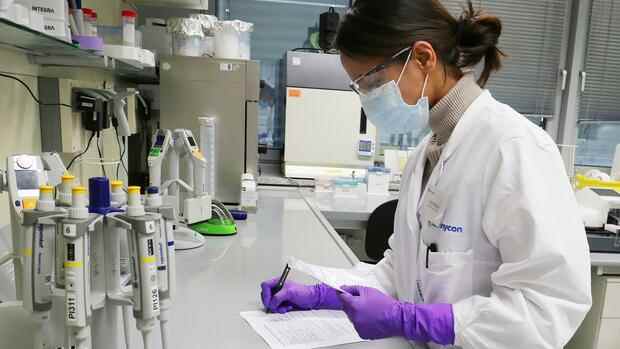Frankfurt It is not every day that German biotech companies receive product approvals for their new drug developments. The Munich Formycon has now achieved such a success both in the USA and in Europe. After the US drug authority FDA gave the green light for the active ingredient called FYB201 at the beginning of August, the EU also granted approval a few days ago.
In the future, the drug will be sold in the EU by the Israeli sales partner Teva under the name Ranivisio. In the UK, Teva has been on the market with the product since July.
It is not about a fundamentally newly researched active molecule, but about a so-called biosimilar, the copy of the biotechnical eye drug Lucentis. The Swiss pharmaceutical giant Roche and its sales partners have so far achieved annual sales of around 3.6 billion euros.
For Formycon, which is listed on the stock exchange, the first approval represents an important milestone that strengthens further perspectives and development opportunities. The Munich-based company, which, like Biontech, is part of the Strüngmann family’s investment portfolio, wants to become one of the leading biosimilar developers and manufacturers.
Top jobs of the day
Find the best jobs now and
be notified by email.
Biosimilars are copycat products for bioengineered medicines. These drugs form a multi-billion dollar segment of the pharmaceutical market, with a number of important patents expiring in the coming years.
Formycon stock has gained about 37 percent year-to-date
Due to the manufacturing method using genetically modified cell cultures, copies of such active ingredients are never 100 percent identical to the originals. Biosimilar developers must therefore prove in clinical studies that their products are just as effective and safe. This in turn makes development relatively complicated and expensive, but also limits the number of potential providers and tends to allow higher margins than with classic generics.
For Formycon, the first important success and the entry of the Strüngmann Group a few months ago have meanwhile also been reflected in the rating. The share price has recently fallen back somewhat, but has increased by around 37 percent since the beginning of the year. With a market capitalization of almost 1.2 billion euros, Formycon is now one of the top five in the German biotech industry – after Biontech, Qiagen, Evotec and Curevac.
>> Read also: Billion IPO planned: Novartis wants to spin off the Sandoz generics division
The company emerged from earlier activities of the Boehringer Mannheim Group at the beginning of the last decade. For a long time, it pursued its development activities in the field of biosimilars in cooperation with Bioeq, a subsidiary of the Strüngmann holding companies Santo and Athos, which bore the lion’s share of the development costs.
In April, the Strüngmann Group incorporated Bioeq into Formycon. In this way, Andreas and Thomas Strüngmann, the former Hexal owners and Biontech major shareholders, also became the largest shareholder in the biosimilar developer, now with almost 27 percent.
Development of Ranivisio took longer than planned
The Lucentis active ingredient ranibizumab delays the progression of what is known as wet macular degeneration. In this relatively widespread eye disease in the elderly, vision is impaired or even completely destroyed by excessive growth of blood vessels in the eye.
The development of Ranivisio took longer than originally planned. Nevertheless, Formycon CFO Nicolas Combé assumes that the drug can achieve peak sales of up to 500 million euros in this market. Formycon itself will only benefit from license income and success fees.
The business itself runs exclusively through sales partners, i.e. through the Ratiopharm parent company Teva in Europe and through the biosimilar specialist Coherus Biosciences in the USA. In addition, the Polish drug manufacturer Polpharma has a 50 percent stake in the product.
According to management’s expectations, income from the marketing of Formycon will only lead to a slight increase in sales in the current year compared to the 36 million euros of the previous year. The net loss should also be similar to 2021 due to continued high development spending. At that time the minus was 13.6 million euros.
Further studies are ongoing
However, a significantly higher share of sales is emerging for Formycon with the following products in the development pipeline. Among other things, the company is working on biosimilars to the psoriasis drug Stelara from Johnson & Johnson and on a biosimilar to the eye drug Eylea from Regeneron and Bayer. Both original products currently generate annual sales of around nine billion euros each and therefore offer considerable market potential.
A few days ago, Formycon was able to present positive phase 3 data for the biosimilar to Stelara, which showed comparable effectiveness. However, the company has yet to repeat a Phase 1 study, in consultation with regulatory authorities, to demonstrate equivalence with regard to other pharmacological properties. An application for approval is therefore only planned for 2023.
The copycat product for Eylea is currently still in a phase 3 study, which should also be completed in 2023. Other biosimilar candidates are at an earlier stage of clinical development. In addition, the company is also working on a drug against Covid-19. However, the first clinical tests for this product are not planned until next year.
More: The Biontech effect: Vaccination against monkeypox inspires Bavarian Nordic.
